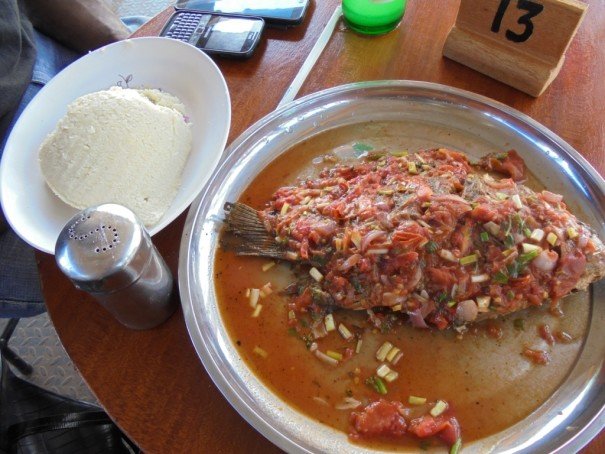
East Coast, Best Coast

East Coast, Best Coast
Beer in Kisumu
Dilapidated wooden boats surge back and forth on this shore of Lake Victoria, its murky brown waters lapping at the feet of a group of fishermen, out to supplement their meager earnings by offering boat rides on the lake. One of them leaps out of a boat and approaches us with long rapid strides, hoping for easy prey. He attempts to dupe us into paying a preposterous fee for an hour’s boat ride.
We survey other options, including a boat called the Queen Elizabeth, but grand names do little to inspire confidence in these modest vessels. We do not wish to die by drowning in Lake Victoria, least of all on the Queen Elizabeth. We are self-respecting Africans, after all. We decide to set off in search of fresh fish to devour instead.
We fend off the aggressive entreaties of the women owners of the many pungent eateries lined up along the bank and settle for one with a balcony overlooking the vast watery expanse that stretches out across the green hills in the distance. A gentle breeze blows our way, providing respite from the heat and humidity of the lakeside city.
Kisumu is a port on Lake Victoria, Africa’s largest lake, which straddles Kenya, Uganda, and Tanzania. Anecdote has it that the name Kisumu comes from the Luo word ‘Kisuma’ meaning ‘a place where people meet to barter.’ Originally a station on the railway to Uganda built by Indian laborers brought by the British, it has grown over the years to become the biggest commercial hub in Western Kenya.
It is set to grow even further following a government initiative to promote tourism in the region. The tourism industry has always been a mainstay of the Kenyan economy, but visitor numbers have steadily declined in recent years due to growing security concerns. The hope now is that Western Kenya can emerge as an alternative destination to the Indian Ocean coast, the preferred destination for most foreign tourists.
It has not been quiet on the eastern front. In 1997, there was a spate of ethnic clashes in Mombasa, which borders the Indian Ocean and is a hugely popular destination both for foreign and domestic tourists. In 2002, there was a bomb attack on Paradise Hotel, the only Israeli-owned hotel in Mombasa, killing 13. In 2014, al Shabaab claimed responsibility for more than 60 deaths in Mpeketoni, a small town in Lamu district. The capital, Nairobi, also hasn’t escaped the web of terror. In 1998, the U.S. embassy in Nairobi was bombed, killing 213 people and wounding 4,000. In 2013, al Shabaab militants attacked the upscale Westgate mall and killed over 80 people. In Kisumu, I was asked whether I felt safer there than I did back home in Nairobi.
We set out to see what else the city has to offer visitors. A local friend takes us to an unprepossessing hole in the wall where he says the best Benga music is to be found; Kisumu’s live music scene is excellent. Even the former prime minister is a patron of this establishment, our friend says. “Luos are the originators of Benga,” a drunken patron informs us. “The Congolese stole from us! They were better at marketing than we were.” The band belts out an endless stream of melodic tunes in Luo, accompanied by guitars and drums.
To the great delight of the male patrons, the band has three well-endowed female dancers take to the floor to display astonishing feats: one twerks vigorously, the other gyrates seductively while balancing a beer bottle on her head, the other does 180-degree splits that threaten to tear her asunder. The crowd cheers and joins the dancing.
Our friend then takes us to the “Beer Belt,” predominantly patronized by students from the local universities, where bars serve alcohol 24/7. He points out a man talking to himself. “He used to be a hawker. He went mad.” The mad hawker hears a Benga tune he recognizes and jumps to his feet to dance. He points to a woman who has picked a fight at the next table. She is striking, with dark silky skin and high cheekbones. “She used to be a teacher. She is a graduate. She is now an alcoholic. What a waste.” We contemplate different kinds of terror: those that come from without, and those come from within.